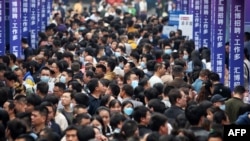The world is looking at a bleak economic picture in China, the world’s second-largest economy: a real-estate crisis on a historic scale, record-high youth unemployment, a deepening crisis of confidence among consumers and investors, the teetering mountain of local government debt and other setbacks.
How does Chinese President Xi Jinping, who just started his unprecedented third term a year ago, plan to turn the economy around?
China’s Third Plenum, the economy-focused, agenda-setting meeting that happens twice a decade, was supposed to answer that. However, the high-profile meeting that had been expected to happen in the past two months hasn’t, raising further concerns about where China’s economy is headed.
What’s a plenum?
A plenum is a plenary session of the ruling Chinese Communist Party’s (CCP) Central Committee. A series of seven “plenums” are held after the “Party Congress,” the party’s biggest meeting held every five years. At least one plenum is held each year, behind closed doors and usually for a few days. As a plenum concludes, China’s state news agency Xinhua releases the decisions made at the meetings.
The First and Second plenums usually deal with fixed procedures, such as power transitions and leadership appointments, rather than decision-making on key policies.
The Third Plenum usually produces key and major policies, especially those related to economic development and reforms.
The Fourth and Fifth plenums used to deal with personnel adjustments of the Central Military Commission, China’s highest national defense organization. Gradually, however, matters of “party building” have become the theme for the Fourth Plenum, while the Fifth Plenum has become the platform where the “Five-Year Plans” — China’s half-decade blueprints for national economic and social development — are formed.
The Sixth Plenum deals with ideological matters.
The Seventh Plenum makes final preparations and announces the dates for the next Party Congress. It occasionally deals with some remaining issues of the current Central Committee, such as announcing punishment for officials with corruption charges.
Why is the Third Plenum key?
The Third Plenum, usually held in October or November of the year following a Party Congress, is usually where the CCP announces its big picture plans over the next five or 10 years.
One key exception was the Third Plenum of the 19th Party Congress, which was pushed to February 2018 after the Second Plenum was used to abolish the term limit for China’s president.
Since China began to “open up and reform” its economy in 1978, under the leadership of Deng Xiaoping, all key CCP decisions on China’s economy and reforms have been made during the third plenums.
The most recent 20th Party Congress was held in October last year, so the latest Third Plenum was supposed to happen in October or November.
The CCP’s failure to designate a date for the upcoming Third Plenum is unprecedented and has raised speculation among some Western-based China analysts as to cause for the delay.
With the weeks of December dwindling, it seems unlikely that the meeting will happen in 2023. If the meeting is delayed until 2024, that would be the first time ever a Third Plenum is held in an off-schedule year — Xi again could be viewed as smashing party norms like he did moving the 2018 Third Plenum to February 2018 and discussing matters supposed to be dealt with at the Second Plenum — only time will tell.




